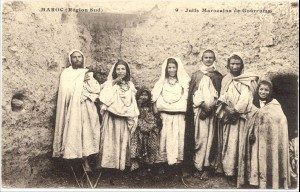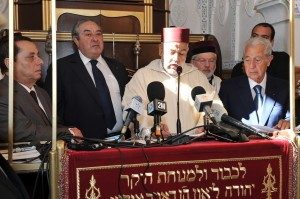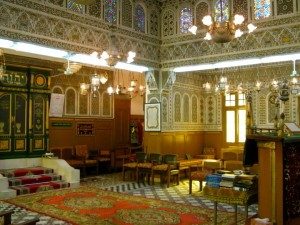1-800-787-8806 | In Morocco + 212-618-88-26-81 | Mail: alecia@morocco-traveler.com
12
FebI am committed to defending the faith and the community of believers and to fulfilling my mission with respect to upholding freedom of religion for all believers in the revealed religions, including Judaism, whose followers are loyal citizens for whom I deeply care.
– King Mohammed VI
Morocco’s grand history of which Jews have historically been a part. Morocco’s history of Jewry and the co-mingling of Jews with Berbers and Arabs are a key factor in why Morocco is safe for Jewish travelers today. Morocco is a country of Muslims, Jews, and Christians. Jews first arrived in Morocco during pre-Christian times, accompanying the Phoenicians on their trade expeditions across the coast of Morocco. In the countryside Jewish and Berber tribes tilled the soil side by side together for two thousand years speaking the Berber dialect. In the towns and cities Jewish merchants and financiers were valued by successive Moroccan rulers who protected them.
 Jews also joined the various waves of Muslims who escaped persecution during the Christian conquests of southern Spain in 1492. Since the Arab-Islamic colonization of Morocco from the 7th Century, these two faiths have coexisted peacefully in Morocco. Jews were also favored by Moroccan Arabs and Berbers (Amazigh) for their business acumen. They were silversmiths, jewelers, and craftsman. The silversmiths of today in Morocco are the product of Moroccan Jews who until the 20th Century lived in Morocco.
Jews also joined the various waves of Muslims who escaped persecution during the Christian conquests of southern Spain in 1492. Since the Arab-Islamic colonization of Morocco from the 7th Century, these two faiths have coexisted peacefully in Morocco. Jews were also favored by Moroccan Arabs and Berbers (Amazigh) for their business acumen. They were silversmiths, jewelers, and craftsman. The silversmiths of today in Morocco are the product of Moroccan Jews who until the 20th Century lived in Morocco.
King Mohammed VI has inherited his father’s tolerance, and kept Jewish Moroccan citizen André Azoulay as one of his royal advisors. André Azoulay is the only royal advisor still in post who has served both King Hassan II and his son King Mohammed VI. In a message at the restoration ceremony of the 17th century Slat al Fassayine Synagogue in Fes in February 2013, which the King supported financially, King Mohammed VI reiterated his commitment to religious freedom and spiritual diversity, and emphasized the importance of the three thousand years of Jewish legacy in Morocco.
 “As Commander of the Faithful,” the King said, “I am committed to defending the faith and the community of believers and to fulfilling my mission with respect to upholding freedom of religion for all believers in the revealed religions, including Judaism, whose followers are loyal citizens for whom I deeply care. The Moroccan people’s cultural traditions, which are steeped in history, are rooted in our citizens’ abiding commitment to the principles of coexistence, tolerance and harmony between the various components of the nation.” The ceremony in Fes, at the Slat al Fassayine Synagogue, was opened by Prime Minister Abdelilah Benkirane of the Islamic PJD party that leads the government coalition. He commended Morocco’s Jewish heritage. The Jewish religion and its heritage was given a special status recognizing it as part of Morocco’s cultural heritage in the 2011 constitution introduced by King Mohammed VI. In times past, Jews traditionally lived in a part of the medina called the Mellah. Most have now moved out into the Ville Nouvelle, although some old synagogues still remain. The majority of Jews in Morocco live in Casablanca, where a visit to the only Jewish museum in the Arab world is well worth the time.
“As Commander of the Faithful,” the King said, “I am committed to defending the faith and the community of believers and to fulfilling my mission with respect to upholding freedom of religion for all believers in the revealed religions, including Judaism, whose followers are loyal citizens for whom I deeply care. The Moroccan people’s cultural traditions, which are steeped in history, are rooted in our citizens’ abiding commitment to the principles of coexistence, tolerance and harmony between the various components of the nation.” The ceremony in Fes, at the Slat al Fassayine Synagogue, was opened by Prime Minister Abdelilah Benkirane of the Islamic PJD party that leads the government coalition. He commended Morocco’s Jewish heritage. The Jewish religion and its heritage was given a special status recognizing it as part of Morocco’s cultural heritage in the 2011 constitution introduced by King Mohammed VI. In times past, Jews traditionally lived in a part of the medina called the Mellah. Most have now moved out into the Ville Nouvelle, although some old synagogues still remain. The majority of Jews in Morocco live in Casablanca, where a visit to the only Jewish museum in the Arab world is well worth the time.Morocco views tourists or foreign visitors as a whole – as one visitor – and does not segregate out those who are Jewish, Christian, Muslim, or of varied races or creeds. In the Imperial Cities, mountain regions, and the Sahara desert Jewish travelers are respected equally. As a Jewish travelers or general tourist visiting Morocco you will never be asked about your religion. Upon arriving in customs, you are required to fill out a form similar to what you fill out upon arriving to the USA, or any other country. Jews are not singled out, in fact if you happen to have Israeli stamps in your passport, it is not an issue. Tourism is one of the main foreign currency earners for Morocco that is deeply committed to developing tourism projects under the comprehensive tourism plan Vision 2020.
Yes. Morocco and Israel have friendly relations. Many Israeli citizens travel to Morocco regularly and in particular to visit various zaouias on a pilgrimage, and also at times to visit land in the old city owned by their forefathers. Some of the Jewish zaouias within Morocco are located in the Tarodaunt region, others in Ourigane, Telouet, and outside Fes. Morocco has a grand history of sacred Jewish sites.
There are approximately 10,000 Jews who currently live in Morocco and most of them reside in the city of Casablanca, yet Morocco’s Jews are an aging population.

Yes. The Museum of Moroccan Judaism is one of the only institutions of its kind in the Muslim world. The museum features a wide range of photographs of synagogues from across the Moroccan Kingdom, Chanukah lamps, Torah scrolls, and a small collection of Jewish chamsas. The museum also showcases Moroccan caftans embroidered with gold, ancient jeweled rugs, and various objects of Jewish-Moroccan cultural heritage. The Museum of Moroccan Judaism was founded by the Jewish community of Casablanca. Its former chief administrator was Simon Levy. Following his death in 2011 the museum underwent renovation.
Morocco’s main Jewish sites are located in Marrakesh and Fes because these two Imperial Cities have preserved Jewish Mellahs in the old medinas, however Jewish sites can be found throughout Morocco. The majority of those located in the new cities or villages are well-preserved. All Jewish sites are protected by the Kingdom of Morocco.
Listed here is an overview of Jewish Synagogues and communities in Morocco.
The largest Jewish community is in Casablanca with over 4,000 inhabitants. There are 17 Synagogues, but not all are operational.
Synagogue Nehim Zemiroth 29, Rue Jean-Jacques Rousseau
Temple Beth El, the Main Synagogue of Casablanca Rue Verlet Hanus.
Em Habanim, 14 rue Lusitania. Benarroch, 24 rue Lusitania. Hazan, rue Roger Farache
The Jewish Community Offices are at Rue Adrienne. Lecouvreur (near Place Verdun).The Chief Rabbi is Rabbi Chalon Messas. The President of community is Dr. L. Benzaquen.
Em Habanim Synagogue, a 17th Century Synagogue, located in the ancient Mellah since it was established in 1438. The Fes Jewish Mellah’s white washed cemetery is one of the most beautiful in the world.
Slat al Fassayine is the oldest synagogue in Fes and played a significant role in the spiritual life of Fes’s once 30,000 strong Jewish community. With financial support from the Jewish community of Fez, the Foundation Jacques Toledano, Serge and Jacques Berdugo, the Simon Levy family, and the Federal Republic of Germany, the restoration which took two years is complete
Ruben Sadoun Synagogue at rue Frejus. The Community President is Rafael Danan.
Fes Jewish Community Center. The Jewish community centre in Fes is at 24 rue Zerktouni
Rabbi Pinhas Synagogue, the oldest synagogue in Marrakesh, Rabbi Pinhas, on Rue Talmud Torah, is still in use. It is located in the historic Mellah established in 1538 next to the local Jewish cemetery, the Miaara, with its brilliant white tombs.
The Beth El Synagogue opposite the American centre in the modern Guéliz is presided over by Jacky Kadoch. There are other synagogues in Marrakesh including: Bitton, rue de Touareg, Attias, rue Saka and Azoulay on rue A. Azoulay.
Jacky Kadoch is president of Essaouira’s Jewish community.
Rabbi Chaim Pinto, the synagogue of the revered Pinto is located in Essaouira’s medina within the Jewish Mellah. The building is an active synagogue, used when pilgrims or Jewish tour groups visit the city. The synagogue is on the second floor of a three-story courtyard building inside the walls of the old city that also contained Rabbi Pinto’s home and office. The building is of whitewashed plaster over masonry. The synagogue consists of a single large room. There are two women’s sections, one across the courtyard and one on the third floor, both with windows looking into the synagogue. There are two Jewish cemeteries in Essaouira.
The El Jadida Community Centre is at Ave. Richard d’lvry and the president is Abraham Ruimy.
In Agadir the Jewish community is at Angle Avenue du Prince Moulay Abdallah
In Safi, the community centre is on Avenue Moulay Youssef Synagogues:Mursiand, rue du R’bat and Beth El, rue du R’bat.Community Centre:1 rue Boussouni.President: Meyer Ohayon.
In Sefrou. The Synagogues:Em Habanim Route B’El. Menzel.President: Rahamim Tobaly,Sla D’El Fouki, in the Mellah. Souk el Araba du Gharb. President: Sam Benoudiz,
In Kenitra the synagogue is at rue Delyon. The Rabbi is Yahia Benarroche. The Community Centre:13 rue Benani. President: David Amar
In Meknes the community centre is at 15, rue du Ghana.
In Ouijda the Community Centre and Synagogue is at rue Sidi-Brahim. Community President is Henri Cohen.
The Grand Synagogue Talmud Tora, 9 rue Moulay Ismail, The Rabbi is Mikail Encaoua: Vice-president of the Rabbinical Court of Appeal (Generally regarded as Chief Rabbi of Morocco).
Synagogues: Talmud Torah and Rebbe Shalom. Zaouia Community Centre: 3 rue Ibn Toumert. President: Albert Derhy.
In Tangiers the Synagogues include: Temple Nahon rue des Synagogues. Yeshiva Etz Haim 43 Av. Sidi Amar.Shaar Raphael Blvd. Pasteur. Other synagogues can be found on the Rue des Synagogues. In the old part of the town, Temple Chocron, rue du Mexique. The Community centre is at 1 rue de la Liberte.
The Tarodaunt region in Southern Morocco has one of the only Adobe synagogues in the world and it is located in the tiny village of Arazan. This Adobe synagogue in Azran has Hebrew prayers in patina on its earthen walls and it ark is adorned with Amazigh decorations. It one of the best-kept secrets of Morocco.
Tetouan: The Community Centre is at Calle Luneta 37. The Community President is Jacob Serfaty.
Copyright 2015 by Morocco Traveler - All Rights Reserved